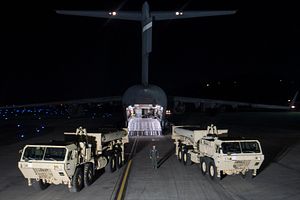Last year, the United States and South Korea decided together to deploy a U.S. Terminal High-Altitude Area Defense (THAAD) missile defense system to better defend against North Korea’s steadily improving ballistic missile capabilities. The decision to deploy the system deeply rankled China, for reasons I’ve discussed in some detail before.
Beijing is so upset about THAAD that it has unofficially sanctioned South Korean firms and driven its relationship with Seoul into the ground. Prior to the THAAD dust-up, the two countries were steadily converging through 2015 and former South Korean President Park Geun-hye had even attended China’s 2015 parade to commemorate the 70th anniversary of the end of World War II.
For the longest time, Washington has been trying to assuage Beijing’s fears about THAAD by offering reassurance that the system’s deployment is South Korea’s sovereign decision and that the system itself is only directed at North Korea. Beijing is concerned about the powerful AN/TPY-2 X-band radar that accompanies the THAAD battery, but repeatedly refused technical talk offers from the United States.
U.S. messaging on this count has been consistent, with a senior administration official noting on Tuesday in a background briefing before U.S. President Donald Trump’s upcoming meeting with Chinese President Xi Jinping that “there will be no move away from protecting our South Korean allies and the United States.”
Also on Tuesday, speaking at an event at Johns Hopkins University’s School of Advanced International Studies, former Director of the Central Intelligence Agency (CIA) Michael Hayden took a different tack to describe THAAD. Hayden, speaking about the problem the United States faces in eliciting Chinese assistance in wrangling North Korea, noted that Beijing treats the North Korean problem as a “toothache,” but has so far avoided going in for a “root canal” to solve the problem, preferring painkillers.
Hayden went on, discussing ways Washington could get that “toothache” to hurt more for China: “Frankly, we did that. President Obama did that with the deployment of THAAD,” he said. “We planted this high-end air defense system in South Korea that has obvious implications for the Chinese because the radar fans go all the way through Manchuria,” he said. “There are things like that, actions we could take that are logical and useful to defend against this particular kind of threat that we should not forgo merely because it would upset the Chinese.”
That marks the most drastic reframing of the THAAD issue from a former U.S. official to my knowledge and will no doubt serve to affirm and vindicate fears about the system in Beijing (a reminder, though, that Hayden did not serve in government during the evaluation of and decision to deploy THAAD and AN/TPY-2). Hayden’s comments will no doubt undermine the case made recently in Foreign Policy by Abe Denmark, a former Obama Department of Defense official, that China’s fear of THAAD is disingenuous.
What’s notable about Hayden’s comments is less the technical observation that the AN/TPY-2 radar reaches into Manchuria — something I’d said was likely in my examination of how the radar might or might not degrade China’s confidence in its own second strike capability. Rather, it’s the entire framing of the THAAD deployment as a point of pressure on China. Even if there was no intent by the Obama administration for the THAAD system to act as an incentive for China to acquiesce on U.S. demands toward North Korea, this framing from a source like Hayden will be taken seriously in Beijing.

































